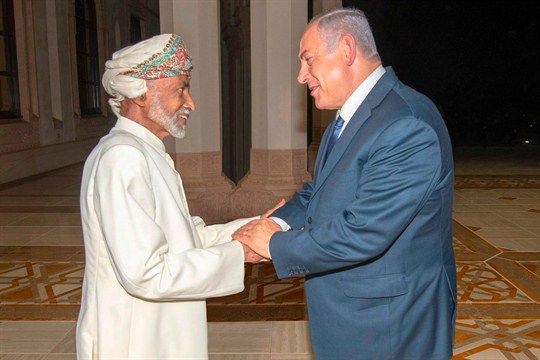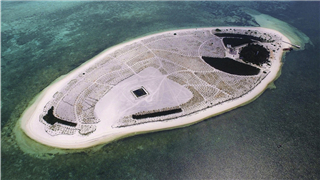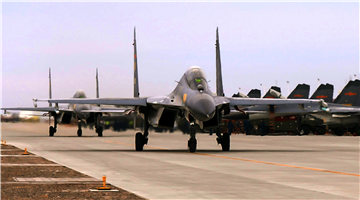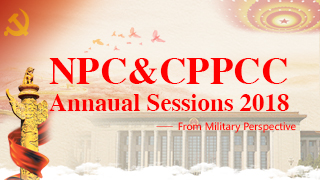By Wang Jin
BEIJING, Dec. 05 (ChinaMil) -- The relationships between Israel and Arab countries have continued to warm up recently. Israeli Prime Minister Benjamin Netanyahu said that he would visit more Arab countries after his visit to the Gulf state Oman last month. Egypt and Jordan are the only two Arab countries that have established formal diplomatic relations with Israel since the late 1970s, whereas in recent years, Israel’s relations with Arab countries have become closer since the geopolitical changes in the Middle East.

Oman’s Sultan Qaboos bin Said, left, and Israeli Prime Minister Benjamin Netanyahu in Muscat, Oman, Oct. 26, 2018
A noteworthy detail also confirmed the change. In the recent World Judo Championships held in the United Arab Emirates (UAE), the host country allowed Israeli anthem to be played with the raising of Israeli flag when Israeli athletes won gold medal. However, just one year ago in October 2017, the UAE organizers banned this action at the awarding ceremony. This notable change of the relations between Israel and the Arab countries in recent one year has drawn the world's attention and speculation about the future relations between the two sides.
The Israeli–Palestinian conflict has been the biggest obstacle to the normalization of relations between Israel and the Arab countries since the First World War battles in the Middle East broke out in 1948. However, the complex geopolitical environment has made it possible for countries of the Middle East to cooperate at certain period of time. In recent years, the claim of “Iranian threat” has become a focus among the political topics of the Middle East. Since the Middle Eastern turmoil in 2011, Iran has been expanding its influence in the Middle East and formed the “Shiite Crescent” in areas from southern Iraq to Syria, Lebanon, and Yemen. Iran’s influence first reached the Mediterranean in one thousand years.
Among the Arab countries, the once powerful Iraq has been dragged down by domestic contradictions after the invasion of the US in 2003; Egypt has been facing complex domestic social and economic problems since 2011; While Saudi Arabia lacks strong military might to support its geostrategic ambitions despite that it has huge oil resources. Therefore, Israel, whose military and scientific power top the Middle East, has become the important “ally candidate” for the Arab world as a counterweight to Iran.
Common geopolitical strategic interests have prompted Israel and Arab countries to work closer. Both Israel and Arab countries are worried a series of unfavorable possibilities related to Iran. For example, Iran might lead the post-war situation in Syria; Hezbollah armed forces in southern Lebanon can pose a huge threat to the domestic political order in Lebanon; The Houthi armed government in the north with close ties to Iran might threaten the strategic interests of Israel and the Arab countries on the shores of the Red Sea. In the Mesopotamian plains, Israel and Arab countries don't want Iraq suppresses domestic Sunni groups under Iran’s influence.
US President Donald Trump has been vigorously promoting the intimate relationship between Israel and the US’s allies in the Middle East after taking office. He hopes to use Saudi Aribia to draw Arab countries in joint blocking and countering Iran, together with Israel. Meanwhile, Trump’s team dealing with Middle East affairs is stepping up the “Deal of the Century” to push forward the solution to the Israeli–Palestinian conflict. Danny Danon, Israel’s Permanent Representative to the United Nations, recently said that the US may announce a "Israeli–Palestinian peace plan" early next year to clear the obstacles in the process of easing relations between Israel and the Arab world.
Despite the growing intimacy between Israel and the Arab countries, the establishment of formal diplomatic relations still takes time. The Israeli–Palestinian conflict has gradually been marginalized for geopolitical reasons in the Middle East countries, but it is still very important in the hearts of many Arab people. Even in Jordan and Egypt, criticism of Israel and sympathy for Palestine are still hot topics among the people. Therefore, rushing to the normalization of relations with Israel is likely to cause severe social and political turmoil in the Gulf Arab countries with relatively conservative political ideology, and over which, leaders of the Gulf Arab countries have to consider seriously.
Disclaimer: The author is Wang Jin. The article was published on the China's National Defense newspaper on December 3. It is translated from Chinese into English and edited by the China Military online.










